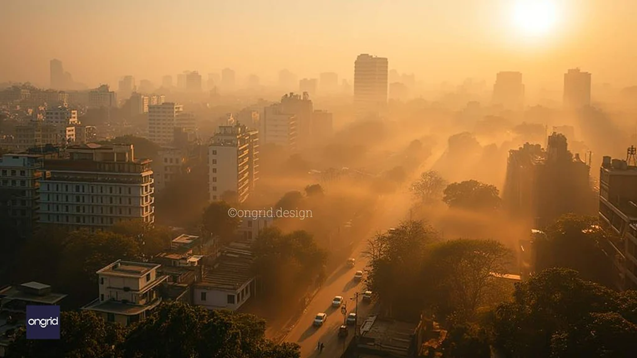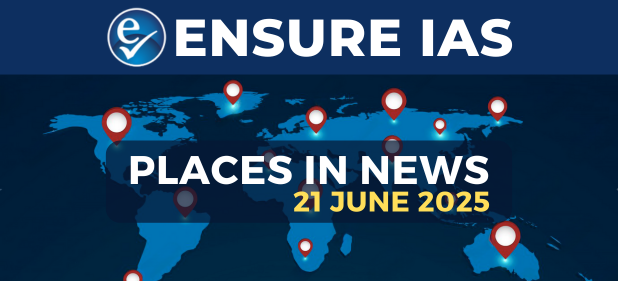- Courses
- GS Full Course 1 Year
- GS Full Course 2 Year
- GS Full Course 3 Year
- GS Full Course Till Selection
- Answer Alpha: Mains 2025 Mentorship
- MEP (Mains Enrichment Programme) Data, Facts
- Essay Target – 150+ Marks
- Online Program
- GS Recorded Course
- Polity
- Geography
- Economy
- Ancient, Medieval and Art & Culture AMAC
- Modern India, Post Independence & World History
- Environment
- Governance
- Science & Technology
- International Relations and Internal Security
- Disaster Management
- Ethics
- NCERT Current Affairs
- Indian Society and Social Issue
- NCERT- Science and Technology
- NCERT - Geography
- NCERT - Ancient History
- NCERT- World History
- NCERT Modern History
- CSAT
- 5 LAYERED ARJUNA Mentorship
- Public Administration Optional
- ABOUT US
- OUR TOPPERS
- TEST SERIES
- FREE STUDY MATERIAL
- VIDEOS
- CONTACT US
Heat-Baked Chennai: A Blueprint for Cooling India's Cities
Heat-Baked Chennai: A Blueprint for Cooling India's Cities
03-06-2024

The Urban Heat Island Effect:
- Growing concern In 2023, the world experienced its hottest year on record, with global temperatures 1.45 degrees Celsius higher than pre-industrial levels, almost touching the 1.5° C limit set in the Paris Agreement.
- This alarming trend is further exacerbated in cities due to the urban heat island (UHI) effect, where temperatures are significantly higher than surrounding rural areas.
- Concrete structures, paved roads and a lack of green spaces trap heat and pollutants, creating an "urban bubble", where temperatures are particularly high at night.
- Regrettably, Chennai has among the lowest percentage of green cover of all the metros in India. The area under the Corporation is greener, with promising initiatives such as “miyawaki forests”.
- Under high humidity conditions, wet-bulb temperature (indicating the extent to which evaporation can take place and facilitate cooling) of around 38.5° C is considered by the World Health Organization to be “near the limits of human survivability”.
|
In India, a heatwave is officially declared in coastal areas when the maximum temperatures are over 37° C and 4.5° C above normal. |
Chennai's Unique Challenge:
- The coastal city of Chennai faces an additional challenge because of its high humidity.
- This reduces the cooling effect of sweating, which can lead to heat stress, exhaustion and even fatal heat strokes.
- The UHI effect in Chennai further aggravates this problem, adding 2°C to 4°C to the temperatures already increased by the coastal climate.
- This combination of heat and humidity creates dangerous conditions for residents, especially the vulnerable poor, infants and the elderly.
Heat Action Plans:
- India has implemented Heat Action Plans (HAPs) at the national, state and district levels to reduce heat-related mortality.
- These plans focus on early warning systems, shade shelters, drinking water arrangements and adjusted working hours for outdoor workers.
- These measures, though necessary, are reactive and do not address the root causes of urban heat.
A Proactive Approach: Mitigating the urban heat island effect
- To effectively deal with the UHI effect, Chennai needs to take proactive measures.
- The Chennai Metropolitan Development Authority (CMDA) has prepared detailed heat maps to guide local planning and actions.
- Additionally, the Chennai Climate Action Plan (CCAP) provides various suggestions to mitigate urban heat, although some experts believe it underestimates causal factors and remedial measures.
Green Cover: A Natural Cooling Solution
- Increasing green cover is an important step in mitigating the UHI effect.
- Green spaces such as urban forests, parks and tree-lined walkways release moisture that cools the environment.
- They also influence the local microclimate, reduce air pollution and promote health and well-being.
- Chennai, which has a lower green cover than other Indian metropolises, could benefit significantly from a well-distributed increase in green spaces.
Energy Efficiency: Reducing Waste Heat
- Waste heat from air conditioners is another significant contributor to the UHI effect.
- In Chennai, about 50% of electricity consumption during summer is due to air conditioning.
- Encouraging the use of energy-efficient air conditioners, better building insulation and ventilation can substantially reduce waste heat and energy consumption, thereby cooling the urban environment.
Additional Measures: A Multi-pronged Approach
- Other measures to reduce the UHI effect include using permeable pavements, increasing shrubs along pavements, and applying reflective paint to roofs, walls, and roads.
- Reducing the use of private vehicles and promoting public transport can further reduce urban heat and pollution.
A Model for India: Chennai's Opportunity
- Chennai, as one of the few cities in India with a Climate Action Plan, has the opportunity to set an example for the rest of the country.
- By implementing comprehensive measures to reduce the UHI effect, the city can improve liveability for its residents and contribute to a cooler, more sustainable future for India.
Must Check: UPSC Coaching Institute In Delhi



